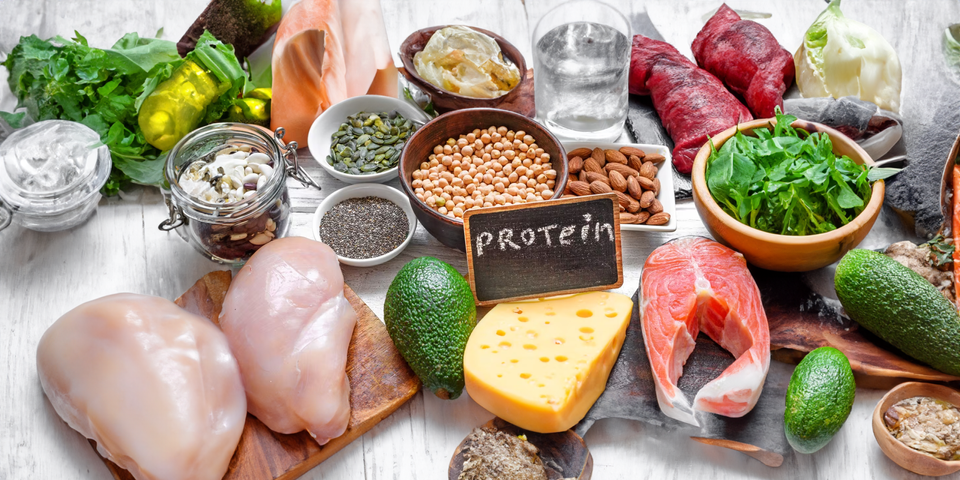Exploring the Array of Protein Supplements: Choosing the Right One for Your Needs

Looking to boost your protein intake and support your fitness goals?
With the wide range of protein supplements available, it can be overwhelming to determine which one is right for you. Whether you're an athlete, a bodybuilder, or simply someone who wants to ensure adequate protein consumption, understanding the different types of protein supplements is essential. In this blog post, we'll delve into the world of protein supplements and guide you through the various options available, helping you make an informed decision about which supplement aligns best with your dietary preferences and fitness objectives. Let's explore the diverse range of protein supplements and find the perfect fit for your needs.
Protein supplements are widely used by athletes, bodybuilders, and individuals looking to support their protein intake. There are several types of protein supplements available, including:
- Whey Protein: Whey protein is one of the most popular and widely available protein supplements. It is derived from milk during the cheese-making process and is quickly absorbed by the body. Whey protein is rich in essential amino acids and is often used to promote muscle recovery and growth.
- Casein Protein: Casein is another protein derived from milk, but it is digested and absorbed more slowly compared to whey protein. Casein forms a gel-like substance in the stomach, which results in a slow release of amino acids into the bloodstream. This slow digestion makes casein an excellent choice for sustained protein release, such as before bedtime.
- Soy Protein: Soy protein is derived from soybeans and is a suitable option for individuals who follow a vegetarian or vegan diet. It is a complete protein, meaning it contains all essential amino acids. Soy protein is also low in fat and cholesterol, making it a popular choice for those looking for plant-based protein sources.
- Pea Protein: Pea protein is made from yellow split peas and is another plant-based protein supplement. It is hypoallergenic and easily digestible. Pea protein is rich in branched-chain amino acids (BCAAs), making it beneficial for muscle recovery and growth.
- Rice Protein: Rice protein is derived from brown or white rice. It is a hypoallergenic and easily digestible option for individuals with food sensitivities or allergies. Rice protein is often combined with other plant-based protein sources to create a complete amino acid profile.
- Hemp Protein: Hemp protein is derived from hemp seeds and is considered a complete protein source. It contains all nine essential amino acids and is rich in omega-3 fatty acids. Hemp protein also provides fiber, making it beneficial for digestive health.
- Collagen Protein: Collagen is the most abundant protein in the body and is responsible for the health and strength of connective tissues, such as skin, joints, and bones. Collagen protein supplements are derived from animal sources, such as bovine or marine collagen. They are often marketed for their potential benefits in promoting skin elasticity, joint health, and reducing joint pain.
These are just a few examples of the different types of protein supplements available on the market.
It's important to consider your dietary preferences, nutritional needs, and any potential allergies or sensitivities when choosing a protein supplement. Consulting with a healthcare professional or registered dietitian can help you determine the most suitable option for your specific goals and requirements.
Power Up Your Plate: Discover Protein-Packed Foods for Optimal Nutrition
There are plenty of excellent food sources that can provide you with a healthy dose of protein. Here are some examples:
- Lean Meats: Skinless chicken breast, turkey breast, lean cuts of beef, and pork tenderloin are all rich sources of high-quality protein. These meats also contain essential amino acids necessary for muscle growth and repair.
- Fish and Seafood: Salmon, tuna, trout, shrimp, and other types of fish and seafood are not only delicious but also packed with protein. They are also great sources of omega-3 fatty acids, which offer numerous health benefits.
- Eggs: Eggs are a versatile and affordable source of protein. They contain all the essential amino acids and can be enjoyed in various ways, such as boiled, scrambled, or in omelets.
- Dairy Products: Milk, Greek yogurt, cottage cheese, and other dairy products are excellent sources of protein. They also provide calcium, which is crucial for bone health.
- Legumes: Beans, lentils, chickpeas, and other legumes are not only rich in protein but also high in fiber. They are a popular choice among vegetarians and vegans for meeting their protein needs.
- Nuts and Seeds: Almonds, walnuts, peanuts, chia seeds, and flaxseeds are examples of protein-rich nuts and seeds. They are also a good source of healthy fats and other essential nutrients. Peanut butter for bonus points.
- Tofu and Tempeh: Tofu and tempeh are plant-based protein sources often used as alternatives to meat. They are made from soybeans and are highly versatile in cooking.
- Quinoa: Quinoa is a grain-like seed that is considered a complete protein source. It contains all essential amino acids and is a great option for vegetarians and vegans.
- Greek Yogurt: Greek yogurt is an excellent source of protein, containing more protein than regular yogurt. It is also a good source of probiotics, which promote gut health.
- Quorn: Quorn is a meat substitute made from mycoprotein, a type of fungi. It is low in saturated fat, high in fiber, and a good source of protein for vegetarian and vegan diets.
Incorporating these protein-rich foods into your diet can help you meet your daily protein requirements while enjoying a variety of flavors and textures. Remember to consider your dietary preferences and any specific nutritional needs when choosing protein sources.
